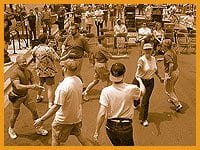Larry White has a picture in his head he’ll never forget.
It was akin to something you’d see in a Labatt “Out Of The Blue” commercial. All the props were in place – Parliament Hill, a handful of gay people on a routine tour, a small boom box and a lenient security guard.
They had no choice.
They began square dancing – smack in the middle of the House of Commons.
It’s all past now, but that spontaneous spirit is what makes Ottawa Date Squares what it is today, says White, co-founder of the local gay square dancing chapter.
“It’s all age groups. There’s no hang-ups about clothing. We wear whatever we want,” explains White of the club that is one of only four like it in Canada. “It’s easy to partner up with whomever. It’s a great way to meet people.”
The spur of the moment scene on the hill is unlikely to repeat itself, but heading into its 10th season, the 18-person club has big plans for the future. They’ll come out globally at the first World OutGames, Rendez-Vous Montreal, in 2006.
White says he’s excited at the opportunity to perform at such a pioneering event. Western dancing, marching bands and gala choruses are also part of the lineup. Anyone who joins now has a shot at performing in Montreal, but White insists the publicity shouldn’t intimidate newcomers to the art.
“Square dancing is a kind of a cumulative thing, you kinda progress. You learn 70 to 80 calls in a year,” he says of the dance that can be compared to a musical bingo game. “It’s easy. Really you can square dance to anything as long as there’s a beat of four.”
Rap music or Top 40 tunes can get any group of eight do-si-do-ing, but White says the club tends to use country music. White describes nights with the Date Squares as a non-smoking, non-drinking environment and calls it “absolutely non-threatening.”
“We all have two left feet and we don’t know what we’re doing,” he laughs.
The Ottawa Date Squares began in February 1995 when White and his then-partner moved to town from Toronto.
“We were both square dancing and it was just too far to go,” jokes White about the commute. “We really struggled at first, but we’ve sort of grown a bit each year.”
The group originally had seven people, which fell short of one for a good square dance. But they learned to “dance with a ghost,” which White says helped them become stronger dancers.
“It kinda solidifies your dancing,” he says. “It makes you aware of yourself.”
The group eventually had a regular “caller,” Mark Benoit, who now runs the show. “He just started learning how to call, he’s really come along quite well,” says White.
Benoit is mainly self-taught, but has attended several courses at little publicized “caller school.”
The club offers classes at all levels and White stresses that it’s not solely for gay people. “Our club is open to everyone,” he says of the group that ranges from 30 to even 70 years of age. “It just happened to be gay people who started.”
Next month, the public is invited to try some classes onthe house. “We have some intro nights in October,” says White. “We invite the community to come and give it a try, it’s free.”
The public can drop in Thu, Oct 14 and Thu, Oct 21 at Le Patro Community Centre (40 Cobourg St). Regular classes start the following week. Fees run at $5/week or slightly less on average for a season.
* For more information check out www.iagsdc.org/ottawa.

 Why you can trust Xtra
Why you can trust Xtra


